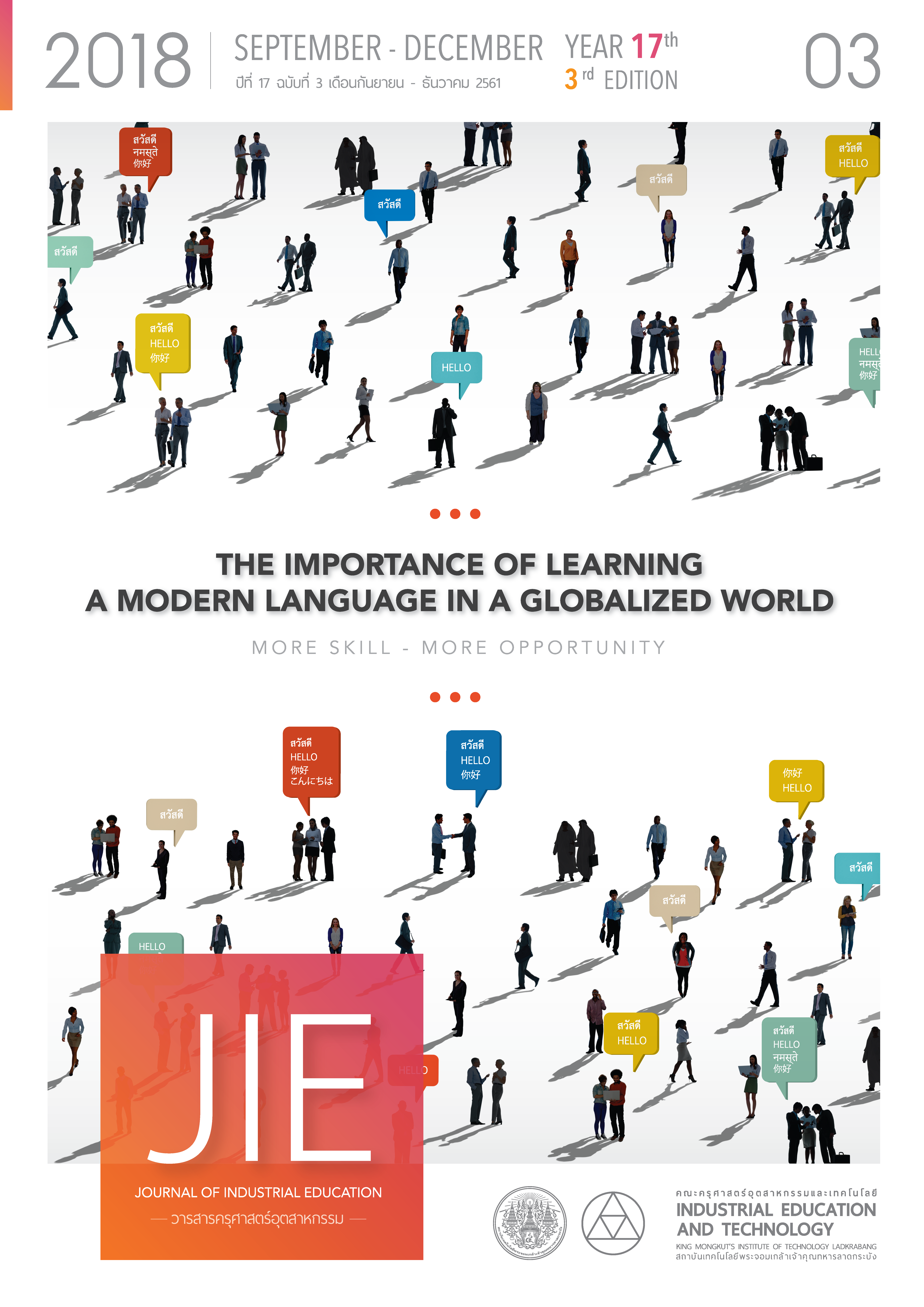THE STUDY OF LEARNING BEHAVIOR OF STUDENT WHO ATTENDED IN ACTIVE LEARNING TO DEVELOP THE LEARNING SKILLS IN 21st CENTURY
Keywords:
Learning Behavior, Active Learning, 21st CenturyAbstract
This research aimed to 1) study learning behavior of student who (received) attended the active learning activities that will develop the learning skills in 21st century, 2) study factor affected to learning skills if student received the active learning 3) study the learning skills in 21st century for student who received the learning activities and 4) study student’s satisfaction in active learning activities. Research samples were 46 students who were 3rd year students that enrolled the Science Communication course by purposive sampling. Research measurement were used 1) Learning activities plan in active learning, 2) Questionnaire about learning behavior, and 3) Interview schedule, 4) Opened-questionnaire, 5) Learning diary, 6) Observation form in learning skills in 21st century, and 7) Satisfaction questionnaire. The quantitative data were analyzed by descriptive statistic (Mean, Standard deviation) and Pearson’s coefficient correlation and the qualitative data was analyzed by content analysis. Result stated that
1) The learning of student from active learning for development of learning skills in 21st century were including in 5 parts; learning behavior part, self-esteem part, motivation of learning part, lecturer behavior part, and stress in learning part and the mean was 4.25 (0.42) at the rather high level.
2) Learning behavior in part of self-esteem and motivation of learning were associated significant at 0.001 and learning behavior of student, lecture behavior and stress in learning were associated significant at 0.005.
3) The active learning activities that will develop the learning skills in 21st century were communication skills, collaborative skills, and computing skills.
4) Student’s satisfaction about the development of learning skills in 21st century contained in 4 parts; being a teacher part, learning activities part, measure and assessment part, and learning support part, the mean was 4.51 (0.48) at the highest level.
References
[2] Tippawan Sukjairungwattana and Thirasak Unaromlert. 2010. A Study of Factors Influencing to well Learning Behavior of Mathayomsuksa 3 Students under office of the Private Education Commission in NakhonPathom Province. Silpakorn educational research journal, 1(2), P. 126-139.
[3] Tisana Khammani. 2004. Science teaching: knowledge in order to provide an effective learning process. Bangkok: Chulalongkorn University Print Bureau.
[4] Sukont Sindhvananda, et al. 2002. The learning process: the learner as important as the curriculum for basic education. Bangkok: Aksorn Charoenthat Company Limited.
[5] Pradinan Uparamai. 1997. Foundations of Education (Chapter 4: Human and Learning) 15th Edition [Online]: Nonthaburi. Available. http://web.aru.ac.th/thanee/images/stories/word/learning123.pdf
[6] Pimpan Dechakoop and Payao Yindeesuk. 2015. Learning Management in 21st Century. 2nd Edition. Bangkok: Chulalongkorn University Printing House.
[7] Samrit Kangpeng. 2017. Curriculum and Instruction Management. 2nd Edition. Mahasarakham: apichart printing.
[8] Vicharn Panit. 2012. The way to create learning for the disciple in 21st Century. Bangkok: Sodsri-Saridwongso Foundation.
[9] Division of Educational Research. 2001. Strategies for teaching and learning in accordance with learning methods (Learning Style). Bangkok: Council Printing.
[10] Pimphan Dechacoop and Payao Yindeesuk. 2018. Active Learning Integrated with PLC For Development. Bangkok: Chulalongkorn University Printing House.
[11] Royal Society of Thailand. 2015. Dictionary of Contemporary Studies, Edition of Royal Society of Thailand. Bangkok: Royal Society of Thailand.
[12] Royal Society of Thailand. 2012. Dictionary of Education, Edition of Royal Society of Thailand. Bangkok: Aroon Printing.
[13] Creswel lJ.W., Plano Clark V.L. 2007. Designing and conducting mixed methods research. Thousand Oaks, CA: Sage Publication.
[14] Puangrat Taveerat, 2000. Research Methods in Behavioral Science and Social Sciences: 7th Edition. Bangkok: Educational and Psychological Test Bureau, Srinakharinwirot University.
[15] Chamnan Dankam, et al. 2016. The Study Of Bachelor Degree Undergraduates' Learning Behavior, Rajabhat Maha Sarakham University. Journal of Nakhonratchasima College,10(1),P23-31.
[16] Meyers, Chet, Jones, B. Thomas. 1993. Promoting active learning (first edition ed.). San Francisco: Jossey-Bass.
[17] Puttiwan Chuangpitak ,Thiyaporn Kantathanawat and Pariyaporn Tungkunanan. 2017. Development of flipped classroom with active learning learning via e-learning in presenting information u sing technology for high school. Journal of industrial Education,16(2), P.89-114.
[18] Sweller, J. 2006. The worked example effect and human cognition: Learning and Instruction. New Jersey: Educational Technologies.
[19] Office of the Royal Society. 2015. Dictionary of Contemporary Educational Terminology. Bangkok: Office of the Royal Society.
[20] Noawanit Songkram. 2012. The Development of integrated instructional model with proactive learning to create knowledge and ability to solve creative problem for undergraduate students in public higher education institutions. Research Grants, Chulalongkorn University.
[21] Bonwell, C.C and Eison, J. 1991. Active Learning: Creating Excitement in the Classroom ASHE-Eric Higher Education Report No.1. Washington, D.C :The George Washington University. School of Education and Human Development.
[22] Bureau of Academic Affairs and Educational Standards, Office of the Basic Education Commission. 2017. Project of Active Learning in the selection and praise of teachers who create learning power. (Active Teacher Award). Bangkok : Mimeographed.
[23] Sukon Sintapanon. 2017. New Teachers with Learning Education 4.0. Bangkok : 9119 Technic Printing Limited Partnership.
[24] Veena Prachagool and Prasart Nuangchalerm. 2016. Teaching Style3rd Edition. Khon Kaen: klungnana wittaya printing.
Downloads
Published
How to Cite
Issue
Section
License
"The opinions and contents including the words in papers are responsibility by the authors."
"ข้อคิดเห็น เนื้อหา รวมทั้งการใช้ภาษาในบทความถือเป็นความรับผิดชอบของผู้เขียน"



